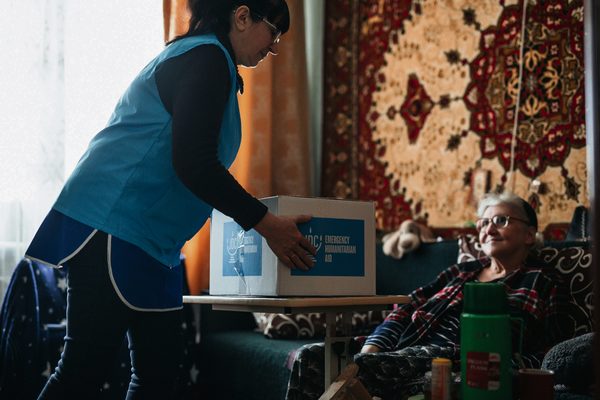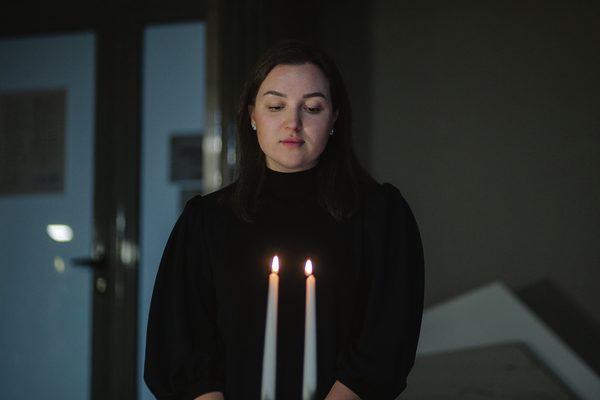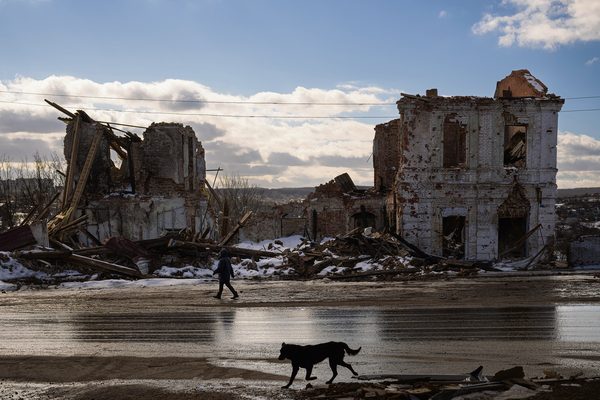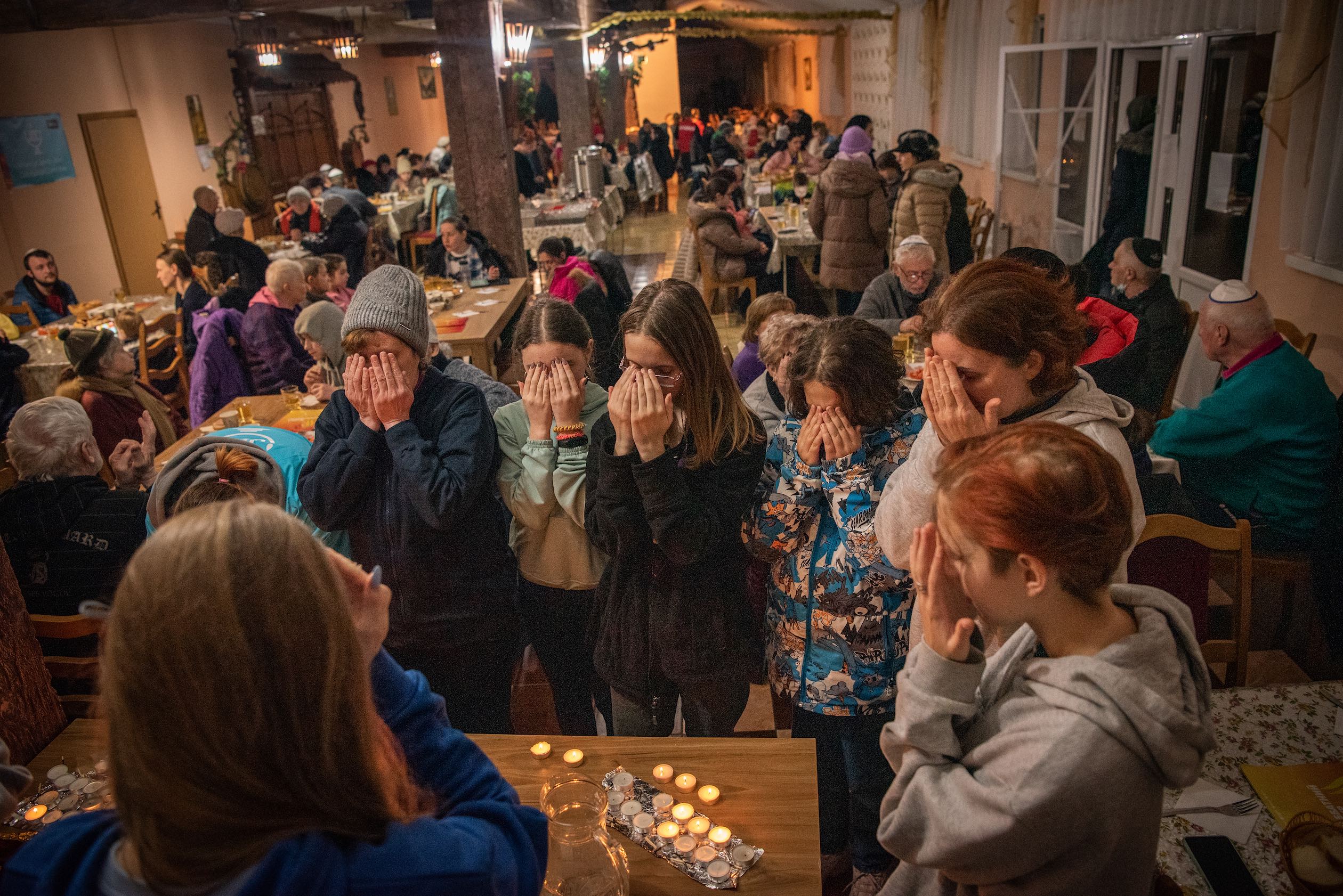A year after Russia declared war on neighbouring Ukraine, more than 7000 civilians have lost their lives and almost 12,000 have been injured. More than eight million have fled to other parts of Europe – almost 20 per cent of the country’s population – according to the United Nations High Commissioner for Refugees, while more than five million people are estimated to be internally displaced, according to the International Organisation for Migration.
Ukraine’s Prime Minister Denys Shmyhal said in January that the war has caused more than US $700 billion in damage.
But this dark chapter has also shown the positive side of humanity, with an outpouring of assistance from around the world helping those suffering in the war zone every day.
The majority of Ukraine’s vibrant 200,000-person pre-conflict Jewish community has remained in the country throughout the conflict. One of these needy Jews is Galina S, an elderly Jewish woman from Kharkiv.
Galina is among the tens of thousands of Jewish seniors the Joint Distribution Committee (JDC or “the Joint”) cares for in Ukraine, some living on as a little as $2 a day.
She is sick and homebound and lives with her son who has multiple disabilities. Before the crisis and through today, Galina still receives food, medicine and home care to ensure her survival and a life of dignity. Her home care worker bravely travels to her during bombardments and before curfews to do Galina’s shopping, cooking and cleaning.
“Earlier in the year, when the crisis began, I simply couldn’t believe it. And later on, when the bombings started, it was horrible,” Galina said.
“But for as long as I can remember, the Joint has helped us. And when my home care worker arrives, and the day somehow begins, all I feel is relief. Without them, I don’t know what would have happened to my family. So, if you asked me about angels, I would say it at once – it’s the Joint. They’re all heroes. They help us even when there’s shelling, they run to us and bring us aid.”
The aid that Galina and others like her get ensures they can endure the punishing winter months now made worse by the widespread destruction of infrastructure and vast outages of heat, power and water. These needs are severely acute, with the World Health Organisation warning: “This winter will be life-threatening for millions of people in Ukraine.”

Across the country, Chesed social service centres and Jewish community centres have been converted into warming centres for those who do not have access to heat or electricity. The Joint has also provided tens of thousands of Jews with sleeping bags that can withstand sub-zero temperatures, firewood and coal, candles and torches, portable heaters, warm clothing and bedding, utility subsidies, and dehydrated and canned goods.
“The Australian Jewish community has played an outsized role in this effort, committing millions to ensure that the Joint is there to help our fellow Jews when they need us most,” the Joint Australia national director Brett Kaye said.
“Because of their support, in the lead up to the conflict and thereafter, we expanded our three-decade operation across the region to ensure humanitarian aid to Jews remaining in Ukraine as well as the thousands of refugees who fled to Poland, Moldova, Hungary and Romania, among other European countries.”
The organisation has provided uninterrupted lifesaving services for more than 43,000 Jews in Ukraine, including winter aid to more than 22,000 people.
“We’ve evacuated over 13,000 Jews from Ukraine in rescue operations that began on February 25, 2022. We aided 40,000 Ukrainian refugees in partnership with European Jewish communities. We distributed over 800 tons of humanitarian assistance. And we’re providing trauma support through seven Trauma Centres in Ukraine and related care for refugees throughout Europe,” Kaye said.
“Behind each of these data-points are hundreds of Joint staff, local Jewish community volunteers, and our network of Chesed social service centres, Jewish community centres, and other institutions built after the fall of the Soviet Union to strengthen Jewish life.”

At the heart of this operation are hundreds of Joint-trained Jewish community volunteers like Stella B, a 28-year old psychologist from Odesa. Stella has been at the forefront of providing comfort and support to the most vulnerable Jews in her storied city on the Black Sea.
She has worked at an emergency call centre to take incoming requests and packed and delivered boxes of humanitarian aid to people who could not leave home or were afraid to do so as air raid sirens constantly blared. She especially loves to lead Shabbat services on Zoom for the elderly, including Holocaust survivors, who can only find community online.
“Our elderly people have faced this situation before, and us volunteers were important to them,” Stella said. “They needed us to distract them from the crisis, if only online, over Zoom. That’s why I held virtual Shabbats, as well as an online Rosh Hashanah and Passover seder. Each Friday, the elderly can enjoy Jewish life and ignore the world outside their window.”
In countries neighbouring Ukraine – especially Poland and Moldova – the Joint continues to care for Ukrainian Jewish refugees. Together with local Jewish communities, it is in contact with and providing some form of aid to some 12,000 people.
What started with food, medical care and accommodation has now expanded to include housing, education, employment, trauma care and participation in local Jewish community activities.
Outside the ongoing conflict, the Joint continues to work across the former Soviet Union addressing the needs of tens of thousands of vulnerable Jews and building Jewish life.
To mark the one-year anniversary of the conflict, the Joint is distributing a downloadable Shabbat for Ukrainian Jews toolkit, urging fellow Jews to incorporate stories of Ukraine’s Jews into their Shabbat practice. The toolkit includes specialised blessings over candles and challah and the traditional Shabbat song Shalom Aleichem featuring personal testimonies of Ukrainian Jews like Galina.

It also has information on the critical needs faced by Ukrainian Jews and Jewish communities today.
“They’re enduring economic turmoil, trauma and despair. But each one of them has found hope, and the will to imagine a brighter future, because of the support they receive from our community through the Joint,” Kaye said.
“As you prepare for Shabbat, I ask you to pray for peace. And I ask you to join us as we do all we can to put into action the ideal that all Jews are responsible for one another – for Jews like Galina who have no one else in the world but the Joint to care for her. “This is our enduring promise to our Jewish family wherever they may be.”
Learn more about the Joint’s Emergency Ukraine Response visit: bit.ly/Ukraineresponse


comments